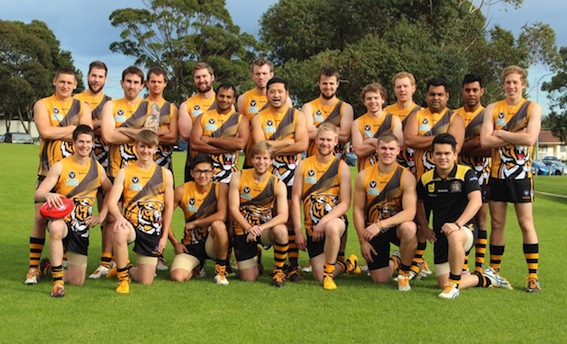Looking back at Masala FC's successful debut season
- Sunday, August 18 2013 @ 07:20 pm ACST
- Contributed by: Aaron Richard
- Views: 3,196


The Masala FC has completed its first season in the VAFA's Club XVIII Division, and although the side only managed two wins for the year, the beginnings of the club's mission of exposing new players from culturally and linguistically diverse backgrounds has been deemed a success thus far.
Since securing a home base in the suburb of Noble Park in Melbourne's south east and playing its first matches earlier this year, Masala has grown to a playing list of almost 50 players, with most of those being new to the code.
The 2013 squad's largest contingent consisted of players of Indian and Sri Lankan backgrounds, but the club also included a number of Anglo-Australians and other players born in (or with both parents born in) Fiji, Zimbabwe, Vietnam, Italy, Serbia, UAE, Kuwait, Afghanistan, NZ, Italy and Estonia.
This broad range of cultures and backgrounds reflects the club's name 'Masala', a word used in numerous languages of India to mean a blend of spices, which in turn is represented by the star anise in the club's logo.
Club officials estimate that 70% of Masala's squad had never formally played footy before. However, it was hard to put an exact figure on this, as a few required transfers from clubs they had trained with but never actually played a match, whilst others thought they required transfers from previous junior footy clubs for which records seemed to be non-existent.
The overall mix of players was roughly 40% from Indian and/or Sri Lankan background, and 30% each of Australians and "Rest of World" players, but these figures are also hard to put exact number on, as a number of the players had mixed family heritage.
Ash Nugent from the club's foundation committee says that as far as he can remember, 47 different players played at least one match with Masala this year, 46 of those playing more than one. "At a guess about 80% remain committed to the club, although this won't necessarily be in a playing capacity in 2014. We lost a couple due to lack of game time, however I would argue expectation goes both ways."
"Once we reached 30 guys on the books we were very clear with all players, especially the new players, that unless you were in the best handful of players, you would only be playing every second or third week, and this is assuming you turned up to training."
"We were allowed a bench of eight at all matches, although we used the maximum only once. This on the one hand allows more players to play each week, but can be frustrating as you're still only allowed 18 on the ground at any given time."
"Several players had holidays throughout the year and there were a few injuries - this makes consistency difficult however it did allow us a few extra rotations."
The club is confident that most of the squad will be back in 2014, including all of the core of better players. "We hope to not only retain the spine of the team, but to build on what is a fantastic culture at Masala."
Masala will also be doing some targeted recruitment towards the end of the year, in preparation for preseason for 2014 kicking off in December.
With the successes in building a playing list, Masala aim to field at least two senior sides next year, possibly moving from the more social Club XVIII competition into the league's more serious Division 4, which would require an ability to field competitive seniors and reserves each week.
Nugent says the decision is ultimately up to the VAFA. "As a committee we are very realistic about how we might perform against stronger clubs and that a strong recruitment drive would be required. At the moment we're the only one-team-club in the VAFA and in order to be on level footing with other clubs (including off the field, such as with sponsorship) we require a Seniors and Reserves. We'd rather do the hard yards now."
Overall, Nugent says the club has been quite happy with its relationship with the association. "We have received the level of support we would expect from the VAFA. After all, we're one of 70+ clubs!"
"Apart from being allowed to participate as a stand alone club, we haven't received any special treatment. Same registration fees for participation, same fines for incorrectly completed paperwork and so on."
"The other clubs have been very supportive of our participation, although in our first year this was limited on-field to Eley Park, Kew, Richmond Central, UHS-VU and of course the Dragons."
The Dragons (officially they dropped the 'Southern' from their name this year, though they're still often referred to as the Southern Dragons) are famous in the international footy community for their pioneering work in growing participation among the Asian Australian migrant communities, although like Masala they feature players from a range of backgrounds.
The Dragons started out as Elgar Park, essentially a single-team club in the Club XVIII loosely connected to Box Hill North, before moving to the Springvale area (home to one of Melbourne's largest South East Asian communities), moving to the Southern FL where they won the Division 3 premiership in 2011, touring to Vietnam and defeating the Swans, and this year moving back to the VAFA where they field three full sides - seniors and reserves in Division 4, and a third side in the same Club XVIII competition as Masala.
With their clubs having similar origins and being located in close proximity, Masala and the Dragons have developed a friendly rivalry. "They've been great, and a few of us knew some of their players and committee members before Masala and the Dragons joined the VAFA. We played a practice match against them before the season and spent some time with them at the Season Launch."
Masala has received support not only from the VAFA and various migrant communities, but also from AFL club Richmond, who supplied the Tiger-styled playing jumpers.
"The jumpers were a huge contribution and took significant financial burden off us in our first year. Richmond also held our Jumper Presentation at the start of the year and held a training session for the team during the season. We hope to build on this in coming years," says Nugent.
Richmond already had a subcontinental connection through supporting the India Tigers in the last International Cup. Five players from the 2011 Indian national team - William Fernandes, Trevor Banerjee, Prakash 'PK' Kailasanathan, Srirangan Giritharan and Fevin Mascarenhas - played for Masala this year.
Whether Masala are able to help add some experience to the Indian national team next year remains to be seen. Nugent says it's a possibility, but will depend on the AFL's decisions regarding eligibility. "Most of our Indian-background players, whilst born overseas, are Aussie citizens. We also have several players of Sri Lankan origin, so I'd say more likely if it was a mixed team or if they allowed a few exceptions."
For now, the summer will see the club build on its successes and lay the foundation for 2014. Anyone wanting to contact Masala FC can do so via facebook.com/masalafc.
Masala FC would like to thank its sponsors Richmond FC, Amity Property Group, McDonalds Noble Park, Bank of Queensland Dandenong and Romak Hardware Distributors.
BELOW: The Masala FC squad from a match vs the Eley Park Sharks earlier this year.



 RSS news
RSS news Twitter
Twitter Facebook
Facebook